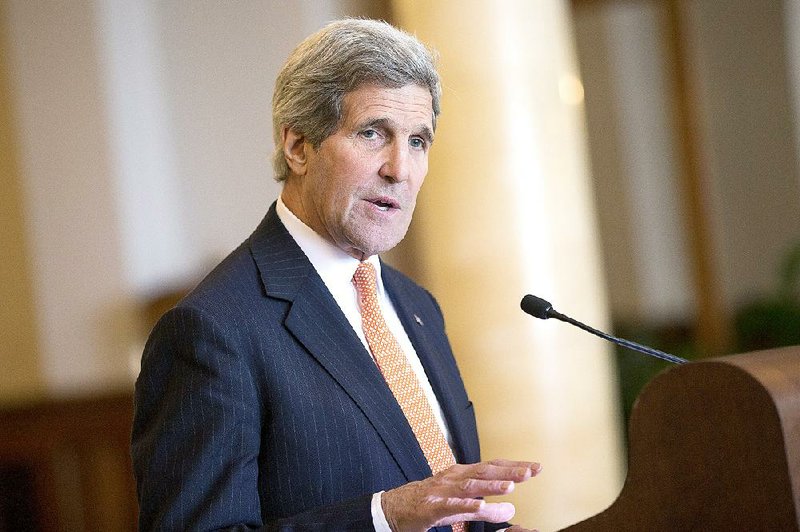MONTREUX, Switzerland -- Secretary of State John Kerry directly rebutted critics of nuclear talks with Iran, saying Wednesday that demands for more sanctions will not slow Iran's nuclear program as much as the agreement being pursued.
Kerry's comments echoed statements from President Barack Obama and marked his first public response to Israeli Prime Minister Benjamin Netanyahu, who denounced the U.S.-led efforts to strike an agreement to rein in Iran's nuclear program.
Kerry, wrapping up three days of talks with Iran's foreign minister, said he would not allow politics or "external factors" to distract him from the negotiations as they moved toward a possible make-or-break juncture at the end of the month.
"The first step is to prevent Iran from acquiring a nuclear weapon," Kerry said. "And we know that absent a deal, Iran will have the ability to move ahead with its nuclear program. That we know for sure, because that's exactly what's happened to date."
The U.S.' aim is to ensure that Iran's nuclear proficiency is used only for peaceful purposes. The West and its allies worry that Iran's ability to enrich uranium could one day be expanded to produce material for a nuclear weapon. Iran says it seeks nuclear fuel for only energy-producing reactors and medical uses.
Kerry said that in more than a decade of talks and sanctions, the only measure that effectively slowed Iran's nuclear expansion was the interim agreement in place since November 2013 while the latest negotiations have taken place.
"No one has presented a more viable, lasting alternative for how you actually prevent Iran from getting a nuclear weapon," he said, noting that sanctions hurt Iran enough to get it to the negotiating table but not enough to stop its nuclear expansion. "So, folks, simply demanding Iran capitulate is not a plan."
"We continue to be focused on reaching a good deal, the right deal," he added.
He spoke shortly after finishing his last round of talks with Iranian Foreign Minister Mohammed Javad Zarif. Kerry planned to fly to Saudi Arabia to meet with the newly crowned King Salman and foreign ministers from other Gulf Arab countries, which view Iran as a major regional rival.
Negotiators for the United States, the European Union and Iran are racing to reach at least a general understanding by the end of March. Then it will be up to Obama to decide whether enough progress has been made for the talks to continue so the sides can iron out technical details by June 30.
Talks are scheduled to resume March 15.
While American and Iranian officials said some progress was made in the latest dialogue, there were no suggestions of a breakthrough.
"We are still working through some difficult issues," said a senior State Department official, without giving further details. The official spoke to reporters on condition of anonymity under the agency's rules.
In Washington, Netanyahu sought to rally opposition to a possible deal in his address to a joint meeting of Congress on Tuesday. Netanyahu said Wednesday that his speech offered a "practical alternative" to a possible Iranian nuclear deal, rebutting Obama's comments that the Israeli leader had offered no viable plan to prevent Iran from getting nuclear weapons.
"I proposed a practical alternative that through tougher restrictions would extend the breakout time, by years, that it would take Iran to reach a nuclear weapon if it decides to breach the agreement," Netanyahu said in a statement released after he landed in Israel.
He said his proposal also would maintain restrictions until Tehran stops "its sponsorship of terrorism around the world, its aggression against its neighbors and its calls for Israel's destruction."
He said he received "very encouraging" responses from Democrats and Republicans.
Negotiators are under pressure to come up with a deal the world will approve of, not only in Israel but in other countries in the region worried about Iran's expanding influence.
"Now, we still don't know whether we will get there, and it is certainly possible that we won't," Kerry said. "It may be that Iran simply can't say yes to the type of deal that the international community requires. But we do know that we owe it to the American people ... [and the] people in the world to try to find out."
The U.S. delegation at the Wednesday talks included Energy Secretary Ernest Moniz, and the Iranian team included Moniz's counterpart, Ali Akbar Salehi.
Information for this article was contributed by Carol Morello, Daniela Deane and Brian Murphy of The Washington Post and Daniel Estrin of The Associated Press.
A Section on 03/05/2015

